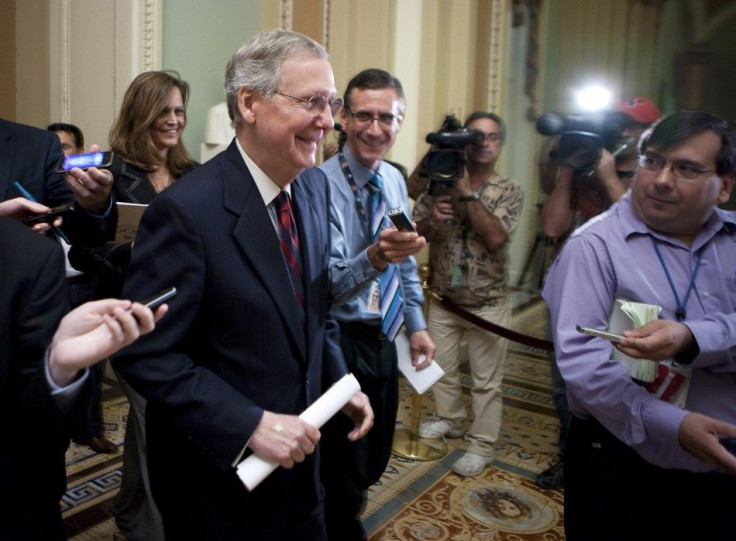Congressional Leaders, Obama Reach Debt Deal, Crucial Votes Ahead

Congressional leaders and President Obama reached a deal to raise the federal debt ceiling in an effort to avoid the first U.S. default but a series of crucial votes in both chambers of Congress remain before the President can sign it into law.
"My message to the world tonight is that this nation and the Congress are moving forward and we are moving forward together," Senate Majority Leader Harry Reid said late Sunday.
The deal was announced just as global markets were set to open. Early stock market results in early Monday trading in Japan, Hong Kong and Australia showed stock prices rising.
Earlier Sunday night House Speaker John Boehner, while attempting to court support for the deal in a conference call with fellow lawmakers showed mixed support, highlighting the trend toward cutting spending in Washington.
"Now listen, this isn't the greatest deal in the world," he said, according to USA Today. " But it shows how much we've changed the terms of the debate in this town."
Obama first announced the deal had been reached in a brief statement to reporters at the White House at 8:40 p.m. local time.
The deal in principle comes even as formal votes must still be taken in the House and Senate to pass the bill and send the final bill to Obama for his signature for the bill to become law.
The first part of the deal calls for $1 trillion in cuts to federal spending over the next decade.
The second part of the deal calls for the establishment of a bipartisan committee in Congress to give another proposal in November to continue to reduce the deficit that will be voted on by full Congress in an up or down vote, Obama said.
"To hold us all accountable for making these reforms, tough cuts that both parties would find objectionable would automatically go into effect if we don't act," he said.
He said the deal "will allow us to avoid default and end the crisis that Washington imposed on the rest of America."
The deal ensures the U.S. won't face the same kind of crisis at least through the next year.
"And it will begin to lift the cloud of uncertainty that hangs over our economy," he said.
"We're not done yet," he said, as he urged members of both parties to vote for the deal in the "next few days."
Path to a Deal
Earlier, Reid said he had "signed-off" on a debt-raising deal that could be voted on as early as Sunday night, while the Senate's Republican leadership had previously indicated that no compromise had been reached.
"Senator Reid has signed off on the debt-ceiling agreement pending caucus approval," a spokesman for the senator said Sunday afternoon.
Reid, who was in high level talks with Republicans Senate Leaders and the White House was conferring with fellow Democrats prior to giving the go-ahead for the deal.
He said he hoped a vote happened Sunday evening ahead of the deadline when the U.S. will begin to default on some of its obligations.
Reid's support for a bill that is expected to cut more than $2 trillion from the federal budget over the next 10 years needed his fellow Democrats' approval.
McConnell had not "signed off on anything" earlier in the evening, according to a report by ABC News. However, he told CNN's "State of the Union" that a deal was "very close."
Meanwhile in the House, Boehner had scheduled a meeting with his caucus.
House Minority Leader Rep. Nancy Pelosi, D-CA had also scheduled a separate meeting with her caucus.
Top level negotiations were continuing on Sunday after an early afternoon attempt by Reid to see if one of his proposals would have enough votes to clear the Senate. It fell short of the 60 "ayes" needed to overcome a Republican Party filibuster. It could only manage a 50-49 vote in favor.
The deal negotiated by McConnell and Vice President Joe Biden included a rise in the federal debt limit in two stages, for a total of $2.2 trillion. The increase would be large enough not to need another raise beyond the 2012 general election.
On Friday, the Senate blocked a bill passed by the House handily, setting the stage for further negotiations.
Republicans and Democrats had been in discussions for months regarding the debt limit as the deadline has approached.
© Copyright IBTimes 2024. All rights reserved.











